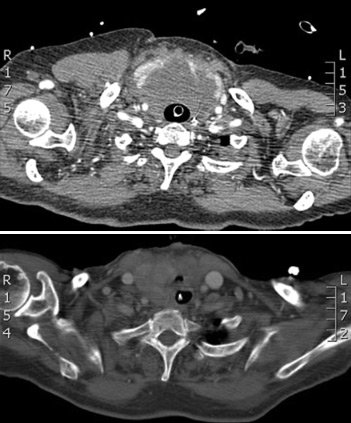Complications
Treatment is surgical if possible.[Figure caption and citation for the preceding image starts]: CT of neck pre- and post-operative: tracheal compression by a thyroid lymphomaVan la Parra RFD, Kroeze J, van Die J, et al. Progressive respiratory distress due to neck mass. BMJ Case Reports. 2009; doi:10.1136/bcr.11.2008.1193 [Citation ends].
Risk is low with an experienced surgeon.
Symptoms include peri-oral numbness, carpopedal spasm, or in severe cases, tetany.
Usually occurs after the first post-operative day and resolves within 1 week; permanent hypocalcaemia is rare.
Transient mild asymptomatic hypocalcaemia is treated with oral calcium and vitamin D. Severe or symptomatic hypocalcaemia is treated with intravenous calcium.
Risk is low with an experienced surgeon.
Majority of nerve injuries are temporary and improve in 2-3 months.
Likelihood of developing permanent hoarseness is low. If there is no improvement after 3 months, the injury is most likely to be permanent and treatment is started with speech therapy.
Operative procedures can be performed, such as medialisation of the vocal cord to improve quality of voice.
Can present as dyspnoea, or as swelling around the operative site.
Treatment includes opening the wound to drain the haematoma and ligate the bleeding vessel.
Patients with a suppressed thyroid-stimulating hormone (TSH) are at increased risk of atrial fibrillation.[90]
There is an increased risk of second haematological malignancies in patients with well-differentiated thyroid cancer who received radioactive iodine (RAI). These patients are at increased risk of developing acute myeloid leukaemia (AML) and chronic myeloid leukaemia. AML that arises after RAI treatment has poor prognosis.[91] Another study has shown increased risk of salivary gland malignancy and leukaemia, with the excess risk of leukaemia significantly greater in patients aged <45 years compared with older patients, in patients receiving RAI.[92]
Based on studies, RAI use should be limited, especially in low-risk thyroid cancer.
Total doses in excess of 200-300 millicuries (mCi) are likely to lead to dryness of the mouth, most of which is temporary. However, in a small percentage of patients it may be long-lasting.
Rarely caused by metastatic thyroid cancer.[94]
Use of this content is subject to our disclaimer